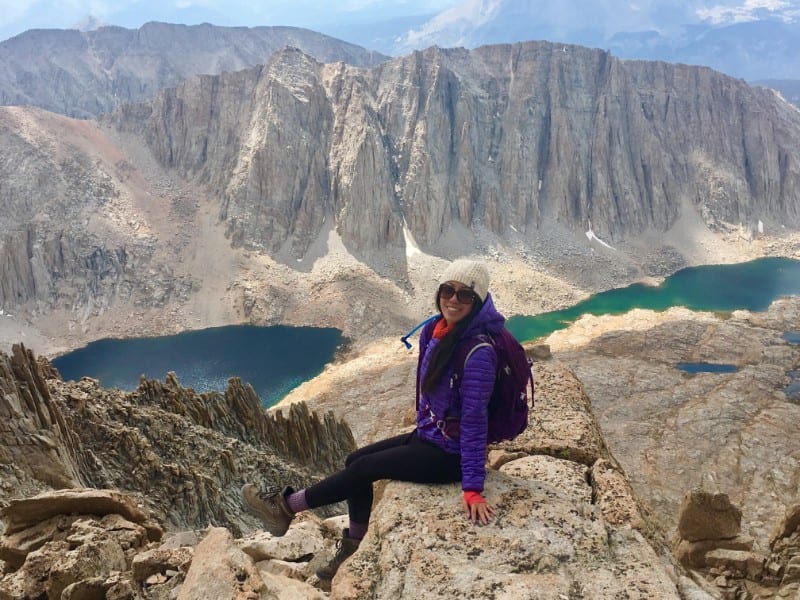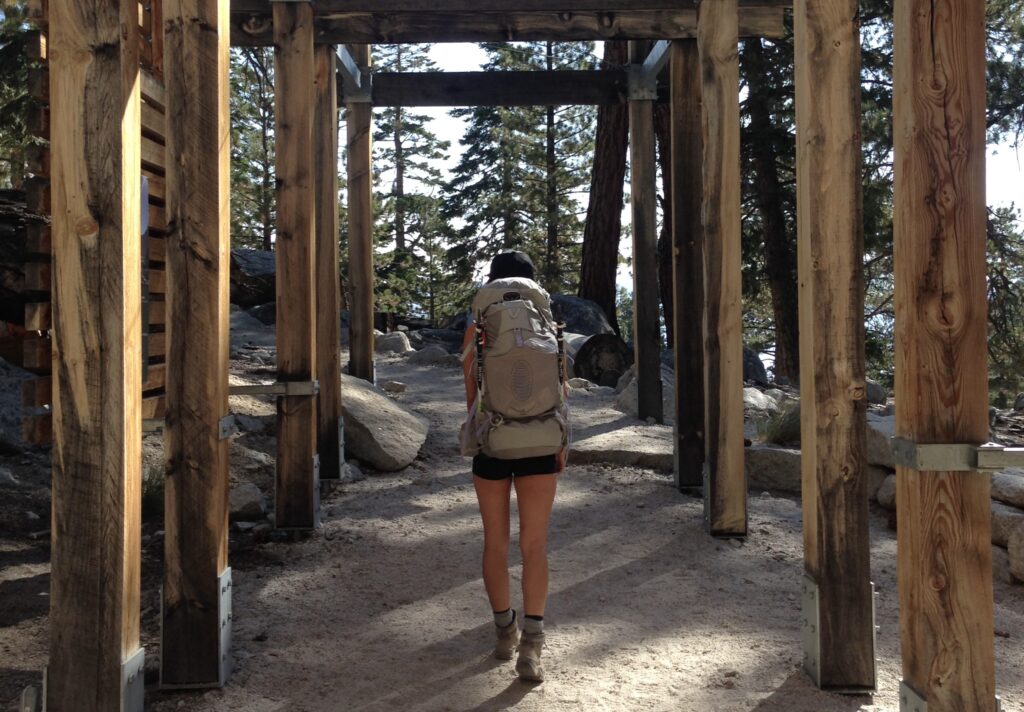Mount Whitney (14,505 ft) is the tallest mountain in the contiguous US (lower 48 states). It’s a long 22-mile out-and-back hike with about 6,000 ft of elevation gain. You can day hike it or overnight camp, but either way, you need a permit which can be obtained during the pre-season lotto or through last-minute permit cancellations. Not sure which experience is best for you? Keep reading.
I’ve been fortunate to
2024 Permits: click to apply for the lotto from 2/1 until 3/1 – learn how to get a Mt Whitney permit here.
Quick background on when I’ve hiked Mt. Whitney:
- August 24-25, 2015 [1st time at Whitney] – backpacked one night, slept at Trail camp
- August 25, 2016 [2nd time at Whitney] – day hike (click to read on page 2)
- August 24, 2017 [3rd time at Whitney] – day hike
- April 24, 2021 – climbed Mountaineers Route
- August 14-15, 2021 – backpacked one night at Consultation Lake
That really depends on your level and training. Neither is better but having done both, if it’s your first time hiking Mt. Whitney, I’d strongly recommend doing it as an overnight hike because you get to enjoy the trail and views as well as acclimate better. Keep reading for more details.
Only if you train for it! I wasn’t much of a hiker until I got my Whitney permits the first time and trained for it. Then my first ascent was a piece of cake. I’ve run into completely novice hikers on the Whitney trail a few times and although some made it… they had a miserable time. Please consider you’re hiking partner too and what you may be putting them through
Yes, you need a permit for both day hikes and overnight hikes! The pre-season lotto ends on March 1
Backpacking Mount Whitney in Two Days, One Night
If you didn't already read my backpacking trail write up, you can read it here. Click for Mt Whitney Overnight Hike Video from my first trip, 2015
If you’ve been following my journey from the beginning, you’ll know I got into hiking when I decided to do Mt. Whitney – a mountain I’d never even heard of before. I trained with the Six Pack of Peaks, doing one peak per month leading up to Whitney, so I honestly didn’t think Whitney was any harder than a previous training hike. I suffered through my training as I threw myself into strenuous hikes right off the bat, but when it came time to tackle this beast, my body was well-prepared, and breaking up the trail into two days helped a lot for my first summit.
Pros:
⛰ You get to enjoy the views going up! If you day hike Whitney, it will be dark for the first half, and you’ll be on a mission to
⛰ You’ll be well-rested and better acclimated to summit day 2 and going up the 99 switchbacks in the dark is a really unique experience – seeing all the headlamps move higher makes it look like stars! Plus catching the sunrise from Trail Crest is simply breathtaking
⛰ Lone Pine Lake – you really get to enjoy spending time here on the trek up!
⛰ On your way down after summiting, you can rest/ take a nap back at camp before heading down
⛰ You can start day 1 at 10 am…. or even noon, instead of 12-2 am.
⛰ Lighter summit pack
⛰ When you wake up on summit day, you’re halfway done with the whole uphill already
Cons:
⛰ Overnight pack + Bear canister + wag bag💩… However, if you’re ultralight hiking, it’s a very pleasant experience! Need tips on how to drop your weight? Check out my ultralight backpacking gear guide.

Day Hiking Mt. Whitney
I had two very different experiences day hiking Mount Whitney. I never wrote about either one but have put together a quick trail report on the next page. The first was definitely more memorable and pleasant and the second was more miserable – I almost decided not to summit. These experiences have led me to believe that mind over matter is a powerful mindset/tool and your stress level and current circumstances in life can affect you on the trails.
22 miles total, 6200+ ft elevation gain in 11 miles topping out at 14500 ft can take a toll on your body.
Pros:
⛰ Finish the hike in one long day = probably take less time off away from work
⛰ No overnight pack and camping gear weight
Cons:
⛰ Time expectancy: 12-14 hours. Most hikers start at 12 – 2 am but plan to summit by late morning to avoid any afternoon thunderstorms which are common in the Sierra in summer. Personally, I cannot hike with little to no sleep.
⛰ Trailhead is at 8300 ft… some people need time to acclimate to that
⛰ Summit is at 14500 ft… your body may not adjust well to 6200 ft elevation gain in one day so plan for that
⛰Your entire pack with all your layers and food goes all 22 miles with you… don’t overpack
Booking travel soon?
Please consider using my affiliate links below. It costs nothing additional for you but helps me maintain the ever-increasing costs of running a travel blog:
General travel through Tripadvisor here.
Book your flights here.
Book your accommodations here on Expedia, Booking.com, Hotels.com, and VRBO.
Book your car rentals here.
Book your tours here.
Book your travel insurance here.
Shop my favorite gear here.
Remember, it’s ok to not
Also, don’t forget – LEAVE NO TRACE. They provide you with a poop bag – it’s not pleasant to carry it down the mountain but they do their best to shield off the odor so don’t hide it and leave it in the mountains!!! Do your part to keep the wilderness pristine so we can all return and enjoy it, please 🙂
Tiff, the owner and author of Follow Tiff’s Journey, is a California/ Colorado-based adventurer and outdoor connoisseur who divides her heart between the Eastern Sierra Mountains and the Colorado Rocky Mountains. Despite her fear of heights, she’s become a seasoned mountaineer, ultralight hiking and backcountry camping enthusiast, expert road trip planner, and a fervent explorer of alpine lakes, natural hot springs, and sandstone canyons.
With 10 years of experience exploring the outdoors, her blog is your go-to source for all things wilderness, offering invaluable insights and pro tips, essential gear recommendations, and awe-inspiring stories from her adventures.
Join Tiff on her quest to share the wonders of nature and inspire others to follow their own path in the great outdoors.



Thanks for sharing your experiences with Whitney!
I have an overnight scheduled for mid September. Question: would it make sense to summit Whitney first, then go to trail camp for the overnight? I know most people camp and summit the next day but I want the challenge of summitting in a day but relaxing a bit afterwards. I live at 6500 feet and haven’t had problems as high as 12-16000 so I don’t think acclimating at trail camp will be necessary.
Your thoughts On this idea?
Thanks!
Hi Brian, Aside from the purpose of acclimating, I think most people do the overnight hike where they camp and summit the next day because hiking Mt. Whitney as a full day hike is very strenuous, and although you wouldn’t be hiking all 22 miles in one day, you would still have to start as early as a day hiker so you can summit at a decent hour. It would be a nice break for your feet to camp on your way down because it’s still a long way. Either way, I feel like you’ll have time to enjoy the trail as an overnight hike, it just depends how vigorous you are I guess.
Are all California’s 14er’s on a permit basis? We don’t have that in Colorado except for 1 know of because it’s on private property. I am in Cali trying to explore and had Mt Whitney on the plan.
No, Mt. Whitney, in particular, is permit-regulated but most others in the Eastern Sierra are not!
I tried doing Whitney back in 2019 but my friend and I started to get really bad altitude sickness right around 13,500. We were both in shape but I guess needed to train a higher altitudes.
Do you think altitude sickness pills would help or maybe carry one of those small disposable oxygen canisters for a pick me up?
Hi Bill, sorry to hear about the altitude sickness. I don’t get very bad altitude sickness so I can’t personally speak to it, but I’ve heard the pills work for some people, oxygen canisters can help if you really struggle with it, and even nose strips can help just to allow more oxygen into your body… but again, I haven’t personally tested any of those. Hope you find a solution that works for you!
Pingback: Kearsarge Pass: Solo Wilderness Trip | Follow Tiff's Journey
Done it several times. this year we didn’t get picked for lottery so we (3 of us) are doing it all in one day with no permits…of the 5 times we’ve been up there we have never seen a ranger. any news of this lately?
Hi Marc, a permit is required to day hike in the Mt. Whitney zone – you will need a permit to hike beyond Lone Pine Lake.
Pingback: Pear Lake Trail in Sequoia National Park
From what I understand no permits are given out or required beyond November 1st correct?
Never-mind I see now that after November the bureaucratic mess goes away and you can just walk up to the ranger station and get your permit.
Pingback: 2021 in Review: The Year of Climbing | Follow Tiff's Journey
Pingback: Hike Iron Mountain via Heaton Flats in Angeles National Forest | Follow Tiff's Journey
Pingback: Climb the Mountaineers Route on Mount Whitney 14,505 ft
I think that, when considering whether you should climb Whitney as a dayhike or a backpack, you need to consider your strengths and weaknesses. I myself can hike Whitney decently fast. My quickest time to the summit was 6:00. And 6:30 is not too difficult. On the other hand, if you strap a 30 pound pack to my back, I would have serious doubts about my ability to even make it to Trail Camp. Especially since you need to do so on the most challenging section of the entire trail (the high rocky steps between Mirror Lake and Trail Camp).
For a person like myself, dayhiking Whitney is just FUN. And since I can get up there fairly quickly, I sleep late and forgo the whole alpine start thing. So I am well-rested and feel good. On the other hand, trying to backpack it would just be setting myself up for a miserable time and, ultimately, failure. I wouldn’t even want to TRY going up there with an overnight pack.
On the other hand, if you are used to backpacking but are less comfortable with blasting up the trail, you might be better off backpacking. Backpacking also might be worth considering if you like the idea of spending the night on the mountain. However, NEVER underestimate the difficulty of lugging a heavy pack over halfway up the mountain. If you are a ‘fast and light’ kind of person and have never strapped on an overnight pack, backpacking might be a horribly bad idea.